|
|
|
Sort Order |
|
|
|
Items / Page
|
|
|
|
|
|
|
| Srl | Item |
| 1 |
ID:
149749
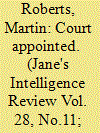

|
|
|
|
|
| Summary/Abstract |
Following the constitutional court's confirmation of the presidential result, Martin Roberts examines the international reaction and implications for Gabon's stability.
|
|
|
|
|
|
|
|
|
|
|
|
|
|
|
|
| 2 |
ID:
130957
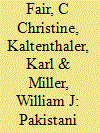

|
|
|
|
|
| Publication |
2014.
|
| Summary/Abstract |
America's Employment of Weaponized Unmanned Aerial Vehicles (Uavs), Popularly Known as "drones," to kill alleged terrorists in Pakistan's federally administered tribal areas (FATA) fuels sustained controversy in Pakistan. Pakistani outrage has steadily deepened since 2008, when the United States increased the frequency of the strikes.1 The increasing use of "signature strikes" has been particularly controversial in (and beyond) Pakistan, because such strikes are targeted at "men believed to be militants associated with terrorist groups, but whose identities aren't always known."2 Whereas personality strikes require the operator to develop a high level of certainty about the target's identity and location, based on multiple sources such as "imagery, cell phone intercepts and informants on the ground,"3 operators may "initiate a signature strike after observing certain patterns of behavior."4 When conducting signature strikes, the United States assesses that the individuals in question exhibit behaviors that match a pre-identified "signature" (for example, pattern of observable activities and/or personal networks) that suggests that they are associated with al Qaeda and/or the Pakistani or Afghan Taliban organizations.5 Because the identity of the target is unknown, even during the strike, it is possible that these persons are innocent civilians, a possibility that both current and former U.S. government officials concede.6 While the George W. Bush administration employed both personality strikes from 2004 and signature strikes from 2008 in Pakistan, the administration of Barack Obama has redoubled the use of both types.7 This has ignited public protests against the drones in Pakistan, particularly in Pakistan's urban areas-far removed from the tribal areas where drones are employed. It has also galvanized a vigorous debate within Pakistan's National Assembly, which tried, but ultimately failed, to curtail the strikes
|
|
|
|
|
|
|
|
|
|
|
|
|
|
|
|
| 3 |
ID:
135253
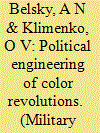

|
|
|
|
|
| Summary/Abstract |
The authors explore the political undercurrents of color revolutions and come up with ways of keeping them in check.
|
|
|
|
|
|
|
|
|
|
|
|
|
|
|
|
| 4 |
ID:
179946
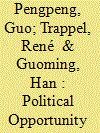

|
|
|
|
|
| Summary/Abstract |
How does "rightful resistance" take place in contemporary rural China? The continuously evolving village election system, the abolishment of the agricultural tax, and a new insistence on fighting corruption seemingly have created more space for the rural population in China to defend its rights. However, the central state's emphasis on solving the so-called three rural issues (sannong wenti 三农 问题)—raising incomes and welfare for the rural population, modernizing the countryside, and developing industrialized and modern agriculture—in a topdown manner and the continued use of "project-based management" have also greatly decreased the ability of the rural population to influence the agenda of the state and have thereby increased the potential for friction between the local state and its rural citizens. This article is a case study of a dispute between villagers and local cadres about the implementation of a reforestation project. While the case shows that villagers have several avenues for protest, it also hints at the low effectiveness of their protest and the continued existence of important structural obstacles dealing with different levels of the administration, including the atomization of villagers, the volatile nature of their interest coalition, and a profound lack of allies in society.
|
|
|
|
|
|
|
|
|
|
|
|
|
|
|
|
| 5 |
ID:
185215
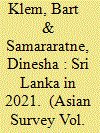

|
|
|
|
|
| Summary/Abstract |
The Rajapaksa government consolidated its position with new laws, special task forces, and public-sector appointments. With the opposition wiped out, Sri Lanka now has a unipolar political landscape. Two successive waves of COVID-19 infections caused a rising death toll and necessitated severe lockdowns. The resulting economic problems exposed structural weaknesses in Sri Lanka’s macroeconomic constellation, with depleting foreign exchange and an acute debt burden. These interlocking crises triggered new forms of protest and a new convergence of previously disparate societal opposition.
|
|
|
|
|
|
|
|
|
|
|
|
|
|
|
|
|
|
|
|
|